Key Takeaways
Blockchain in travel apps is revolutionizing travel apps by enhancing transparency, security, and efficiency across transactions.
Smart contracts and decentralized systems automate bookings, payments, and vendor settlements, reducing delays and costs.
Tokenized loyalty programs powered by blockchain improve customer engagement and retention.
AI and blockchain integration enable personalized, data-secure, and intelligent travel experiences.
Scalable and compliant implementation of blockchain requires careful tech selection and expert guidance.
Future-ready travel apps will rely on the role of blockchain in travel apps for real-time, trust-based, and borderless operations.
JPLoft empowers brands to integrate blockchain seamlessly, helping transform travel apps into secure, intelligent, and future-focused digital solutions.
The travel industry is rapidly evolving, and blockchain in travel apps is emerging as one of its most powerful catalysts for innovation.
From secure transactions and transparent data sharing to enhanced user trust, the impact of blockchain in travel apps is reshaping how modern travel apps operate.
It not only improves operational efficiency but also builds a more connected and reliable digital ecosystem for travelers and service providers.
As data privacy and payment security become top priorities, the importance of blockchain in travel apps is more evident than ever, offering unparalleled transparency and accountability.
In 2026, the role of blockchain in travel apps goes far beyond security; it’s redefining personalization, loyalty programs, and booking systems to deliver smarter, faster, and more trustworthy travel experiences.
An Overview of Travel Apps
Travel apps have revolutionized how people explore the world. From booking flights and accommodations to discovering local attractions, everything can now be managed with just a few taps. These apps combine convenience, personalization, and innovation, empowering travelers to plan every step of their journey effortlessly.
For businesses, understanding user needs and market expectations is crucial before entering this space. Factors like UI/UX design, features, and the cost to develop a travel app play a vital role in defining the overall success and scalability of such platforms. The modern traveler seeks seamless connectivity, instant updates, and trusted digital experiences, making technology the backbone of this industry.
As digital transformation accelerates, many startups and enterprises are exploring how to create a travel app that not only attracts users but also integrates advanced tools like blockchain in travel apps, AI, and real-time analytics. These innovations are reshaping the competitive landscape, ensuring travel apps stay smarter, more secure, and future-ready.
Key Concepts of Blockchain
Understanding blockchain is essential before exploring the role of blockchain in travel apps.
Here are the fundamental concepts that define this transformative technology:
► Decentralization
Blockchain operates without a central authority. Instead, transactions are validated by multiple participants across a distributed network.
This decentralization enhances transparency and security, a vital benefit for travel businesses managing sensitive user data and payments.
► Transparency and Immutability
Every transaction recorded on a blockchain is permanent and tamper-proof. This ensures complete trust between users, airlines, hotels, and agencies.
Companies considering modern digital transformation often assess the cost to create an app like Agoda, factoring in blockchain’s potential to reduce fraud and disputes.
► Smart Contracts
Smart contracts automatically execute agreements when predefined conditions are met, eliminating intermediaries.
For travel platforms, this means faster payments, secure bookings, and verifiable transactions.
Businesses analyzing the cost to develop a travel app like Visit Dubai can see how smart contracts streamline processes while reducing operational costs.
► Tokenization
Tokenization converts assets (like loyalty points or reservations) into digital tokens that can be securely traded or redeemed.
This concept opens new opportunities for reward programs and user engagement. Travel startups studying how to create an app like Hopper often integrate tokenization to add gamified experiences or cross-partner rewards.
► Integration with Emerging Technologies
Blockchain doesn’t work in isolation. When combined with AI, IoT, and AR in travel apps, it can create highly interactive, transparent, and data-driven ecosystems.
For example, augmented reality (AR) powered by blockchain can offer verified location-based experiences while ensuring authenticity and secure data sharing.
How Blockchain Adds Value to Travel Apps?
The importance of blockchain in travel apps goes beyond mere data storage; it’s about creating trust, transparency, and efficiency, three factors traditional systems often struggle with.
From secure bookings to automated payments, the impact of blockchain in travel apps eliminates friction points that have long plagued travelers, service providers, and app developers alike.
Let’s explore the role of blockchain in travel apps and how it adds measurable value to every stakeholder involved.
1] Enhanced Data Security and Privacy
One of the biggest advantages of blockchain in travel apps is decentralized data security. Unlike centralized databases, where sensitive information is stored in one location, blockchain distributes user data across multiple nodes, making it nearly impossible to hack or alter.
This decentralized design protects personal and financial details like passport data, credit card information, and travel itineraries from breaches. Moreover, every change in data is timestamped and cryptographically verified, ensuring end-to-end transparency.
This trust-driven approach not only strengthens user confidence but also helps developers create apps with top travel app features that meet global security and compliance standards such as GDPR and PCI DSS.
2] Eliminating Intermediaries and Reducing Costs
Traditional travel platforms depend heavily on third-party booking agencies and aggregators, which add commissions and inflate prices. Blockchain’s peer-to-peer architecture removes these middlemen by directly connecting travelers with hotels, airlines, or tour operators.
Through smart contracts, booking agreements and payments are executed automatically once both parties meet pre-defined conditions. This model cuts operational costs, shortens transaction times, and ensures fair pricing.
By eliminating redundant intermediaries, blockchain effectively tackles travel app development challenges related to complex supply chains and revenue leakage, leading to greater profitability for businesses and affordability for travelers.
3] Improved Customer Loyalty and Engagement
Customer loyalty has always been a challenge in the travel industry. Blockchain introduces tokenized reward ecosystems, enabling users to earn, store, and redeem points across multiple platforms seamlessly.
Instead of being limited to one brand or service, travelers can use their blockchain-backed tokens for flights, hotels, or dining, increasing the perceived value of loyalty programs.
When integrated with AI in hospitality, these systems go a step further, analyzing user preferences, travel habits, and spending patterns to offer personalized rewards in real time. This combination of AI and blockchain fosters deeper engagement, customer retention, and a more tailored travel experience.
4] Boosting Transparency and Trust in Bookings
Fraud and misinformation are persistent problems in online bookings. Blockchain’s immutable ledger ensures that every transaction from a hotel reservation to a flight booking is permanently recorded, traceable, and verifiable.
This transparency prevents double-bookings, fake listings, and payment disputes. Both travelers and service providers can access verified data, reducing dependency on centralized validation systems.
According to recent travel app development trends, transparency is becoming a defining factor in how users choose their booking platforms. Blockchain, by its very nature, reinforces this trust, turning digital travel interactions into auditable, tamper-proof transactions.
5] Facilitating Global Payments and Cross-Border Transactions
For global travelers, managing multiple currencies and transaction fees can be frustrating. Blockchain solves this by enabling borderless payments through cryptocurrencies or stablecoins.
Using blockchain-powered wallets, travelers can make instant payments for bookings without worrying about conversion delays or high international fees. Meanwhile, businesses benefit from lower payment processing costs and faster settlement times.
This functionality allows travel companies to reach wider audiences, expand internationally, and provide a more seamless customer experience.
The Role of Blockchain in Travel Apps
The role of blockchain in travel apps extends beyond data storage or transaction management; it’s about building trust-driven digital ecosystems. Here’s how it empowers the entire travel value chain:
-
For travelers: Secure data ownership, fair pricing, faster refunds, and real-time loyalty rewards.
-
For businesses: Fraud prevention, cost optimization, transparent supplier contracts, and efficient settlements.
-
For developers: Easier integration of decentralized features, interoperable payment gateways, and compliance-ready infrastructure.
Essentially, blockchain acts as the backbone of transparency and automation, enabling next-gen travel apps to evolve from transactional tools into holistic, trust-centric platforms.
Blockchain doesn’t just add value to travel apps; it redefines them. By introducing verifiable transactions, decentralized security, and cross-border efficiency, it bridges the trust gap between users and providers.
Whether you’re building an AI-powered itinerary app or a full-scale booking platform, integrating blockchain ensures your app is future-ready, scalable, and built for global impact.
Steps to Integrate Blockchain into Travel Apps
Integrating blockchain into travel apps requires careful planning, technical understanding, and strategic execution.
Here’s a step-by-step breakdown of how businesses can successfully implement this technology:
Step 1: Define the Purpose and Scope
The first step is identifying what problem blockchain will solve, whether it’s secure payments, loyalty programs, or data transparency.
A clear roadmap ensures alignment with your business goals and user needs. This clarity is also essential when exploring travel app monetization strategies that can be enhanced through blockchain-based transactions and smart contracts.
Step 2: Choose the Right Blockchain Platform
Different blockchains (like Ethereum, Hyperledger, or Solana) serve unique purposes.
Selecting one depends on scalability, transaction speed, and cost efficiency.
Businesses often analyze how successful platforms like the best travel apps utilize blockchain to enhance reliability and customer engagement before deciding their own tech stack.
Step 3: Design Smart Contracts for Automation
Smart contracts automate key processes like payments, bookings, and refunds—eliminating the need for intermediaries.
They enhance transparency, minimize fraud risks, and significantly improve operational efficiency.
By integrating blockchain-based smart contracts, travel apps can streamline cross-platform transactions and build stronger trust with users through secure, verifiable processes.
Step 4: Ensure Secure Data Integration
Data from users, partners, and vendors must be encrypted and decentralized. Integrating blockchain at this stage ensures that sensitive information remains tamper-proof and verifiable.
A major reason why online travel apps fail is the lack of robust data management. Blockchain helps eliminate that vulnerability.
Step 5: Test and Deploy the Blockchain Network
Before full-scale deployment, rigorous testing is essential to ensure performance, compatibility, and user experience. Once validated, apps can be rolled out gradually to maintain reliability and minimize risk. Continuous monitoring will help in maintaining transparency and system integrity.
Competitors Landscape: A Case Study on Top Apps
To understand how blockchain can transform the travel industry, it’s crucial to analyze how leading travel apps operate, innovate, and secure user trust.
Here’s a breakdown of what top players do right:
1] TripAdvisor, Community-Driven Trust and Transparency
TripAdvisor thrives on its vast user-generated content ecosystem. By enabling millions of reviews and ratings, it creates a trustworthy platform for travelers.
Integrating blockchain could further validate reviews through immutable ledgers, enhancing authenticity. For developers exploring how to make an app like Tripadvisor, this presents a clear path to build verified, review-based systems with blockchain-backed trust.
2] Kayak, Aggregation and Seamless Experience
Kayak leads in simplifying complex travel searches by aggregating data from multiple booking sources.
With blockchain, such aggregation can become more transparent and secure, ensuring real-time updates and verifiable transactions.
Teams learning how to develop an app like Kayak can leverage blockchain to automate cross-vendor settlements while maintaining data integrity.
3] Omio, Cross-Border Blockchain Use Case
Omio focuses on intercity and international travel, often requiring complex payment systems. Blockchain simplifies these operations by enabling fast, low-cost, and borderless transactions.
For entrepreneurs aiming to create an app like Omio, this case showcases how blockchain can effectively address challenges such as exchange rate discrepancies, delayed confirmations, and high transaction fees, making global travel bookings smoother and more secure.
4] Airbnb, Trust Economy and Data Security
Airbnb’s success lies in its trust-driven sharing economy, yet concerns around data privacy and user protection continue to surface.
Blockchain’s decentralized model can address these issues by giving users greater control over their personal data and enhancing overall transparency.
Entrepreneurs exploring how to make an app like Airbnb can leverage blockchain to strengthen cybersecurity frameworks, ensure data authenticity, and build deeper user trust within their platforms.
5] Expedia, Design and Experience as Differentiators
Expedia has mastered the balance between functionality and design, using a sleek interface to maintain customer loyalty. Blockchain can further enhance this experience by adding transparency to bookings and transactions without complicating usability.
Entrepreneurs aiming to develop an app like Expedia can draw inspiration from its intuitive design approach, combining blockchain’s secure infrastructure with a frictionless user journey to deliver both trust and convenience.
Revenue Models: How Blockchain Can Help to Gain Revenue?
Blockchain doesn’t just improve transparency; it can redefine how travel apps generate and sustain revenue. Here’s how businesses can leverage it for long-term profitability:
1. Tokenized Loyalty Programs
Traditional loyalty points often limit user engagement. Blockchain enables tokenized loyalty systems, where users earn, trade, or redeem tokens across multiple platforms.
This multi-app usability increases retention and brand trust. Developers exploring how to build an AI travel agent can merge AI personalization with blockchain tokens to recommend exclusive offers based on travel behavior, boosting both engagement and earnings.
2. Decentralized Payment Gateways
With blockchain-based payments, travel platforms can bypass third-party transaction fees, reducing costs for both users and businesses.
It ensures real-time settlements and eliminates chargeback risks, an ideal setup for global travel ecosystems.
Those working on how to develop a travel planner app like Tripit can use decentralized payments to streamline international booking and reimbursement flows.
3. Smart Contracts for Vendor Settlements
Travel apps often juggle multiple vendors, hotels, airlines, and car rentals, and settlements can be tedious.
Blockchain automates these through smart contracts, executing payments instantly upon service completion.
Developers focusing on how to develop an app like Expedia can integrate blockchain to manage vendor commissions transparently, cutting operational overhead and building trust among partners.
4. NFT-Based Premium Services
NFTs (non-fungible tokens) can introduce premium features such as limited-time offers, exclusive travel passes, or event-based memberships.
This not only drives additional income but also gives users a sense of ownership and exclusivity.
5. Reduced Fraud and Chargeback Losses
Fraudulent bookings and chargebacks often eat into travel app profits. Blockchain’s immutable records make transactions verifiable and irreversible, drastically lowering fraud-related losses.
Before going live, conducting thorough travel app testing helps ensure that blockchain layers integrate seamlessly with existing security protocols and deliver reliable performance.
Cost to Integrate Blockchain Technology into Travel Apps
Integrating blockchain into travel apps can cost anywhere between $25,000 and $100,000+, depending on the app’s scale, complexity, and functionality. Based on the level of blockchain technology integration into travel apps, the price range differs as follows.
-
Basic blockchain integration: $25,000 – $45,000
-
Mid-level app with AI or loyalty modules: $50,000 – $90,000
-
Advanced app (AI + smart contracts + multi-chain): $100,000+
The exact figure depends on the tech stack, developer expertise, and scope of blockchain deployment.
Besides, you can have a look at the key cost determinants given below to help estimate the investment more accurately.
► Development Complexity and Features
The total cost varies depending on whether the app includes simple booking and payment features or advanced modules like smart contracts, decentralized storage, and tokenized loyalty systems.
For instance, those planning how to build an AI trip planner app with blockchain-enabled personalization and itinerary tracking can expect a higher integration cost due to multi-layered AI and blockchain functionalities.
► Blockchain Type and Network Selection
Choosing between public, private, or hybrid blockchain networks directly affects costs. Public blockchains (like Ethereum) have lower setup costs but higher transaction fees, while private ones offer scalability with a higher initial investment.
Businesses exploring how to create a flight booking app can benefit from a hybrid blockchain for secure, scalable, and cost-efficient transactions.
► Smart Contract Development and Integration
Smart contracts automate payments, refunds, and vendor settlements, but require skilled blockchain developers.
The more intricate the logic, such as linking hotel availability or cross-app token usage, the higher the development and auditing expenses.
Similarly, if you’re working on how to build an AI itinerary app, integrating predictive AI algorithms with blockchain’s data verification system can further elevate development costs.
► Security Testing and Maintenance
After development, the app requires extensive testing to ensure blockchain layers function seamlessly with existing systems.
Periodic updates, scalability enhancements, and ongoing audits also add to the total cost. Travel businesses looking into how to build a tour guide app with blockchain-led authentication features should budget for regular maintenance and security validations.
What’s the Future of Adding Blockchain to Travel Apps?
The fusion of blockchain, AI, and IoT is shaping a smarter, more transparent travel industry.
Here’s a glimpse into how the future of travel apps will evolve with blockchain at their core:
1] Seamless and Secure Travel Ecosystems
Future travel apps will integrate blockchain to create unified ecosystems connecting travelers, agencies, and service providers through transparent data sharing.
Developers aiming to create a mobile app with global payment and identity management features can rely on blockchain to ensure seamless authentication and real-time verification.
2] AI-Blockchain Synergy for Personalized Travel
As artificial intelligence (AI) and blockchain converge, personalization will reach new heights.
Blockchain ensures the authenticity of user data, while AI tailors recommendations and offers accordingly.
Businesses planning to build an AI app that leverages blockchain-backed analytics can deliver hyper-personalized experiences while keeping user data secure.
3] Rise of Decentralized Marketplaces
The future travel economy will shift toward decentralized marketplaces, removing intermediaries and enabling peer-to-peer bookings.
This transformation will open new avenues for entrepreneurs to build scalable, transparent, and commission-free travel solutions that redefine how travelers connect with service providers.
4] On-Demand Travel Services Powered by Blockchain
From last-minute bookings to dynamic pricing and instant cancellations, blockchain will make on-demand travel services faster and more reliable.
Partnering with an on-demand app development company can help brands capitalize on blockchain’s speed and automation, ensuring instant verification and smooth payments across travel touchpoints.
5] Global Standardization and Cross-Platform Integration
With increasing interoperability among blockchains, the future will see travel apps seamlessly integrating across borders and platforms.
Users will enjoy a single, verifiable travel identity usable across airlines, hotels, and local experiences, all powered by blockchain.
Challenges to Implement Blockchain in Travel Apps
While blockchain offers transformative potential, integrating it into travel apps is not without hurdles. Businesses must understand and address these challenges to ensure successful adoption.
1. High Initial Development Costs
Implementing blockchain requires skilled developers, robust frameworks, and reliable infrastructure. These factors increase the upfront cost, particularly for startups building scalable platforms.
The right mobile app tech stack plays a crucial role in ensuring compatibility between blockchain layers, databases, and AI-powered features without overloading system resources.
2. Complex Integration with Existing Systems
Many travel businesses still rely on legacy systems that aren’t built for decentralization.
Integrating blockchain into these infrastructures requires time, technical expertise, and careful execution, areas where mobile app development companies in the USA excel.
By modernizing legacy architectures, redesigning workflows, and ensuring seamless data migration, these experts help travel brands transition smoothly into a blockchain-powered ecosystem while maintaining operational stability and performance.
3. Regulatory and Compliance Issues
Travel apps must operate across borders, each governed by different data and payment laws.
Blockchain’s decentralized nature can complicate compliance with regional regulations like GDPR or data residency requirements.
Navigating these legal frameworks requires strong governance and transparent operational models.
4. Scalability and Network Performance
As the number of blockchain transactions grows, ensuring speed and scalability becomes a challenge.
Travel platforms that handle real-time bookings must select blockchain protocols capable of high throughput and low latency.
5. User Experience and Design Limitations
Blockchain’s complexity can create friction in the user experience if not implemented thoughtfully. It’s essential to blend security with simplicity.
A well-optimized mobile app design can make blockchain interactions, such as verifying bookings or using crypto payments, feel effortless for end users.
Connect with JPLoft and Integrate this Strategy into Your Travel Apps
Integrating blockchain into your travel app can elevate your business from being just another booking platform to a trusted, transparent, and tech-forward brand. But to achieve that transformation, you need the right development partner.
At JPLoft, we combine deep expertise in blockchain, AI, and mobile technologies to help travel brands integrate blockchain into travel apps efficiently. As a leading travel app development company, we design scalable, secure, and high-performance platforms that drive engagement, cut costs, and boost profitability.
Whether you want to launch a blockchain-powered booking system, introduce tokenized loyalty rewards, or enhance payment transparency, our team delivers end-to-end solutions that match your vision and goals.
Let’s collaborate to make your travel app smarter, faster, and ready for the next wave of innovation.
Conclusion
Blockchain in travel apps is rapidly transforming the travel industry, offering unprecedented levels of security, transparency, and operational efficiency.
From smart contracts to tokenized loyalty programs, the role of blockchain in travel apps bridges trust gaps and unlocks new revenue streams for both travelers and businesses.
Understanding the importance of blockchain in travel apps ensures that platforms are scalable, secure, and future-ready, while early adoption provides a competitive edge.
By leveraging the impact of blockchain in travel apps, travel apps can deliver smarter, faster, and more reliable experiences, creating lasting value and redefining how users interact with digital travel services.
FAQs
Blockchain in travel apps refers to the use of decentralized, tamper-proof ledgers to manage bookings, payments, and user data securely. It is important because it increases transparency, reduces fraud, automates transactions through smart contracts, and enhances trust among travelers and service providers.
Blockchain enables real-time, peer-to-peer payments without intermediaries. This reduces transaction fees, eliminates chargebacks, and allows instant cross-border transactions, making bookings faster, cheaper, and more secure.
Common use cases include tokenized loyalty programs, verified user reviews, decentralized identity management, smart contract-based bookings, and secure payment gateways.
Travelers gain secure, transparent, and personalized experiences, while businesses benefit from cost reduction, fraud prevention, automated processes, and improved customer trust.
In 2026, blockchain adds value by enhancing security, enabling decentralized payments, supporting tokenized rewards, automating contracts, and facilitating cross-platform interoperability. These innovations streamline operations and elevate the overall travel experience.





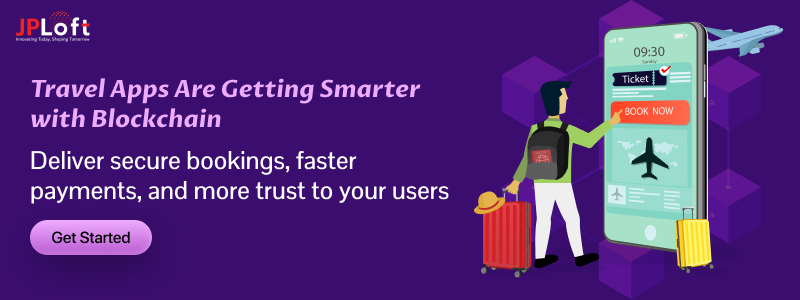
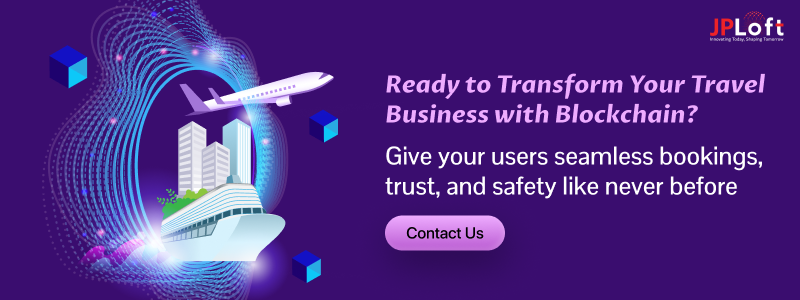

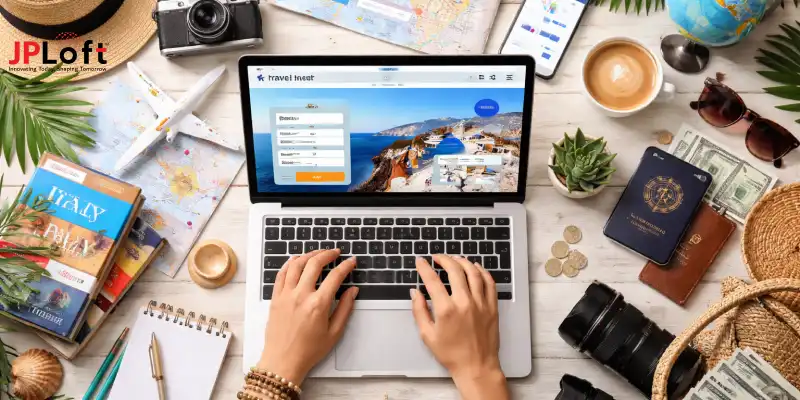
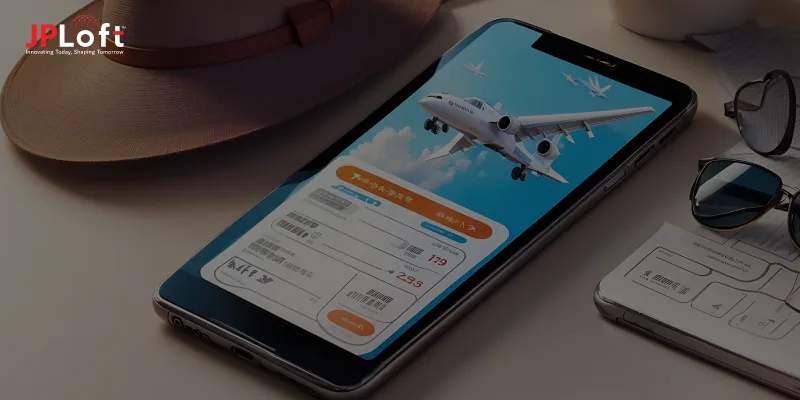
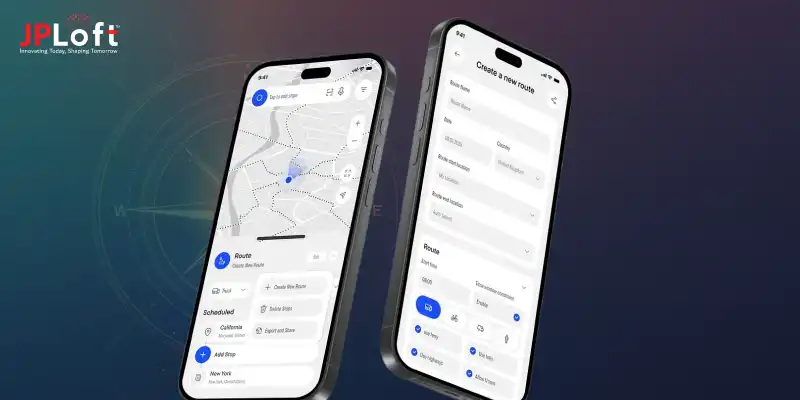


Share this blog